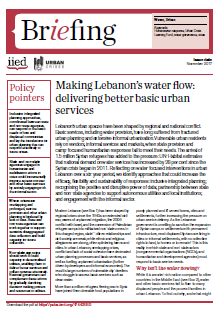Making Lebanon's water flow: delivering better basic urban services
 |
note Nov 2017 ; 4 pages
Aut. Anna Walnycki
Ed. IIED - London
Téléchargeable sous format: PdF
Abstract:
Lebanon’s urban spaces have been shaped by regional and national conflict. Basic services, including water provision, have long suffered from fractured urban planning and extensive informal urbanisation. Vulnerable urban residents rely on vendors, informal services and markets, when state provision and camp-focused humanitarian responses fail to meet their needs. The arrival of 1.5 million Syrian refugees has added to the pressure: UN-Habitat estimates that national demand on water services has increased by 28 per cent since the Syrian crisis began in 2011. Reflecting on water-focused interventions in urban Lebanon over a six-year period, we identify approaches that could increase the efficacy, flexibility and sustainability of responses: inclusive integrated planning; recognising the positive and disruptive power of data; partnership between state and non-state agencies to support autonomous utilities and local institutions; and engagement with the informal sector.
Public-Cible:
Mots clefs: |
accès à l'eau (CI) (DT) (OP) (ope) , humanitaire, urgentiste (CI) (DT) (OP) (ope) , urbain (CI) (DT) (OP) (ope) |
Pays concerné: |
Editeur/Diffuseur: |
|
IIED
-
International Institute for Environment and Development - London - Royaume Uni |
En cas de lien brisé, nous le mentionner à communication@pseau.org